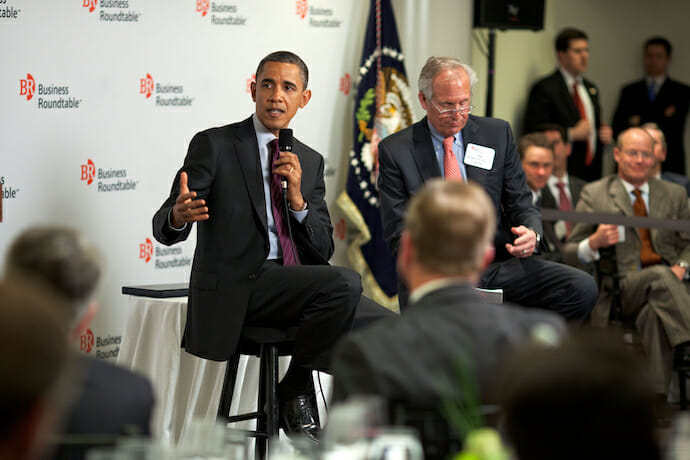
Business
Back to the Future: The New ‘Statement on the Purpose of a Corporation’
Move over, Hollywood! The Business Roundtable (BRT) – one of the most prestigious organizations of corporate leaders in America, if not the world, founded in 1972 – has clearly outdone Tinseltown in peddling fantasy for mass entertainment. Last Monday, with much fanfare and amidst lavish accolades of self-congratulation, thumbs-up, and lots of hoopla, BRT unveiled the result of its many months of hard work that involved—in addition to CEO members of the most exclusive club of who-is-who in American corporate world—prominent economists, public figures, and politicians.
Many dinners, private meetings, conferences, and conference calls, and more dinners later, BRT made public its brand new “Statement on the Purpose of a Corporation” that announced to the world about the new direction to which leaders of some of the most prominent American corporations committed themselves by affixing their signatures. The list led by J.P. Morgan includes some of the biggest giants of American business world—the likes of Amazon, Apple, Bank of America, Boeing, GM, Walmart, etc. etc. There were some detractors, including Alcoa, Blackstone, GE, Kaiser Permanente, NextEra, Parker Hannifin, and State Farm. However, the dissent has stolen little from the luster of the event.
The main message coming from and for American businesses is this: making profit and increasing wealth for investors is no longer the most important business objective. Its authors point finger at shareholders’ democracy that has, in their view, failed America and its people. It has slowed down economic growth, widened the gap between the rich and the poor, contributed to environmental degradation, and led to other problems we currently face. Darren Walker, the president of the Ford Foundation and a Pepsi board member, said in an interview he gave the aftermath of the announcement: “The ideology of shareholder primacy has contributed to the economic inequality we see today in America.”
The signatories triumphantly proclaim that they will no longer adhere to the maxim they have followed for decades: producing value and wealth for stockholders. They have not completely renounced the old purpose, but they have moved it from the first, and only, place in their corporate guidebook to the last. The converts to the new creed have acknowledged in numerous interviews and public statements that now they are going to set things right for America and its people. (Read the full statement here.)
Creating value for customers now tops the list of priorities. Other purposes that follow it include (in this order) investing in employees, dealing fairly with suppliers (both big and small), supporting communities and protecting the environment. The creation of value for shareholders occupies the last place on the list. In addition, the word “value” is qualified by the adjective “long-term,” which suggests that investors should moderate their acquisitive instincts and settle for more modest rewards over time. Although the main message is more implicit than explicit, it is still very clear: shareholders’ democracy gets the blame for whatever inadequacies our top executives see with the current economic, and not only economic, conditions.
On close reading, the statement raises more questions than it provides answers:
It is not clear, and the document does not even attempt to clarify, why creating value for customers is dissociated from creating value for shareholders. Isn’t value just value? Doesn’t creating value benefits society as a whole? If it does not, perhaps those who are responsible for creating value and wealth create something that may appear as value but in actuality is not?
Investing in employees appears unobjectionable, but it also raises questions. This clause suggests that employees are not fairly compensated under the current practice. Is it really true? After all, chief executives are also employees and if their compensation over the last several decades has been unfair, it has been unfairly high. According to the Economic Policy Institute, chief executives at large companies make roughly $278 for every $1 a typical worker earns, up from $20 in 1965 and $58 in 1989. The document does not touch this sensitive issue, suggesting that all employees have been compensated unfairly.

The part about supporting employees through training and education looks overly general and needs substance. What purpose should training and education of employees serve? This policy has to make sense as part of the overall strategy of how corporations will be run. In what way will corporations change their approaches to management so that personal development of employees would make sense. As it is, one is inclined to assume that there will be no changes in management practices; companies and corporations will continue to use the same hierarchical model that they have used so far, except that now employees will be more cultured and educated.
But this is not all. There is a cryptic sentence attached at the very end of this section of the document that makes references to diversity, inclusion, dignity, and respect. While all these words are very positive and by themselves produce no objections, in the context of the statement they suggest that executives will engage in promoting causes that have little to do with economics and more to do with social and political agendas that lie outside of the principal function of economic enterprises. One wonders if focusing on gender identity, the Second Amendment, or who sits in the White House should really be high on corporate agendas. Do we really want corporate leaders to get more involved in politics and social engineering? Wouldn’t such extension of their roles represent the next stage in the trend that is generally known as neo-liberalism, that has led to intimate involvement of corporate leaders into politics, and that has dominated America over the last several decades with disastrous consequences?
The paragraph that talks about the need to support communities suggest more, perhaps and likely much more than just contributing to local communities. It emphasizes, among other things, “embracing sustainable practices” and “environmental protection.” These references could mean anything from cleaning up the mess that a corporation has created—a perfectly legitimate expectation—to supporting political agendas such as the “Green New Deal.” The devil is in details and details are not there. Many Americans will find the use of vast corporate resources in pursuit of political goals to be objectionable since the clarion call among them is to get big money out of politics, not in it.
Last but certainly not least is the clause that deals with shareholders. One should emphasize the word “last” in this sentence; it is very significant that corporate leaders do not think that increasing wealth of their investors should really be their first and most important goal. As has been mentioned, several major companies have not signed the statement. Obviously, they have reservations about the proclaimed re-orientation. There can be only one effect that putting investors last will have: they will simply run to those who continue to see increasing their wealth as priority number one. Indeed, what would you do or, in fact, what would any sensible person do if someone would tell them that they will take your money but will use it for purposes other than maximizing your wealth, potentially including even political causes that you may not support?
Business Roundtable announces the release of a new Statement on the Purpose of a Corporation signed by 181 CEOs who commit to leading their companies for the benefit of all stakeholders – customers, employees, suppliers, communities and shareholders. https://t.co/ZWMRTDZRqA. pic.twitter.com/8Kd4IVFjva
— Business Roundtable (@BizRoundtable) August 19, 2019
There is one lingering question that relates to this statement: What is really behind this reorientation? Why is it and why is it now? Perhaps the best way to read this document is in the context of what has been going on in the American economy and politics over the last several decades. The main problem that this country has faced and continues to face is the problem of growth. Neither traditional Keynesian economics, nor Reaganomics, nor neo-liberalism really worked. The economy has remained stagnant. The effects of stagnation, both economic and political, have been detrimental. Perhaps the most serious one is the political and social instability in America.
The common wisdom is that the current instability is in no small degree due to corporate greed and the decline in the standard of living of common Americans. The corporate elite is certainly not unaware of this criticism. The new formulation of the corporate purpose seems to be a response. In his explanation, J.P. Morgan Chase CEO Jamie Dimon, who chairs BRT, said that the statement “is an acknowledgment that business can do more to help the average American.” The question is, will it?
There is a reason why the bulk of wealth over the last several decades went to the top of our economic elite. This reason is not greed, although greed certainly is there. The real reason is the failure of our elites, both economic and political, to solve the problem of growth. Slow growth is largely due to inefficiencies in our economy. Inefficiency leads to higher prices. Increased prices squeeze consumers out of the market. Only those with money can afford to buy things. Therefore, the market begins to re-orient itself and cater primarily to those who can pay. That’s what has created current trends in consumption patterns. That’s why we see more exclusive real estate, more luxurious cars, airplane tickets that cost 40K a pop and provide all imaginable conveniences and fine dining while on the way to luxurious locations, private jets, mega yachts, and much, much else. That is why prices on paintings by great masters go through the roof.
If the problem were simple greed, it would be relatively easily correctable. But the problem is deeper. The luxury market and conspicuous consumption overtake our economy. The economy responds to the abnormal conditions of slow growth. The economic elite has to have more money since they drive this luxury-oriented economy. If they do not consume these luxuries, the economy will stall even more. No matter what the corporate brass and politicians will promise, they cannot deliver unless they solve the problem of growth; and there is no indication that they are anywhere close to such a solution. Moreover, the statement does not even mention this elephant in the room.
As it is, the authors of the document offer nothing new. Andrew Ross Sorkin, a contributor to the New York Times, notes approvingly, and quite correctly, that the statement will bring us back to the “managerialism” of the New Deal era. One wonders, though, how can “managerialism” be a solution if it got us into trouble in the first place back in the mid-1970s—the time of stagflation?
What is the solution? How can we solve the problem of growth? Obviously, by making our economy more efficient. What does this mean? Human capacity to create is our most valuable economic resource. By utilizing this resource efficiently, we can achieve exponential growth since creating new products, new approaches, new solutions that have not existed before works against depreciation, provides access to new resources, and accelerates rates of economic development. We have to use this creative capacity to the fullest extent possible and, unlike any other resource we have, it only appreciates when used. In order to achieve the fullest possible utilization of the creative capacity of all individuals, we have to change the way we run our economy and corporations.
As it currently stands, hierarchies are dominant in our business world. Hierarchies are important and useful for optimization. They are not particularly creative, and they are not conducive to full utilization of creative capacities. The best environment for such utilization is horizontal interactions in which equal individuals embrace each other’s differences and create new, more inclusive and, consequently, more powerful ideas and visions. Hierarchies are essential for optimizing new creations but their vertical subordination stifles creativity. The answer that follows from these observations is that we must end the domination of hierarchies. We must balance hierarchical and non-hierarchical interactions at our economic enterprises and in corporations. In order to achieve this goal, we must change our managerial practices. We do not see this realization in the “Statement on the Purpose of a Corporation.”
The statement shows that our business elite, regretfully, is not even thinking in this direction. Rather than recognize the fact of their failure and engage in serous discussions of the reasons and solutions, members of this elite put the blame on shareholders’ democracy. Such irresponsible vilification of investors can only result in the continuation of the trends that have created the problems we face, in the persistence of sluggish growth, and in the further instigation of social tensions that are the source of our current political instability.

